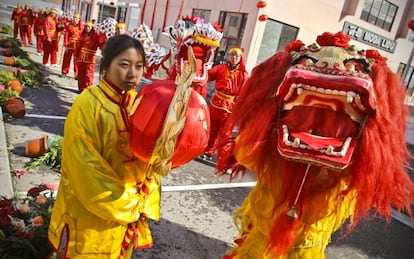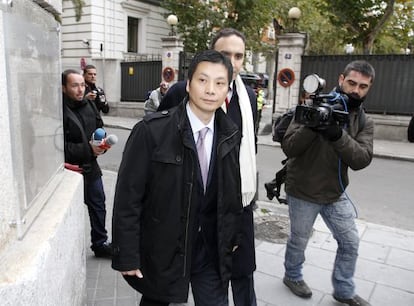Has Operation Emperor led to 'Chinaphobia' in Spain?
Parts of the Chinese community feel they have been under attack ever since a major money-laundering crime ring was busted

Xu Songhua has lived for almost half of his 63 years in Spain, but he still cannot speak Spanish. Not that this has stopped him from becoming one of the most successful members of the Chinese business community in Spain - he owns travel agencies, restaurants and corner stores. He is also the president of EFCO, the European Federation of Chinese Organizations. "It is difficult to learn, and when I arrived here I had no time to study, only to work," he says. "And now I'm simply lazy, so I get my family to translate for me." Nevertheless, he says he has always felt at home in Spain, and has never considered returning to China. Until now. "For the first time I am thinking about going back. Things have changed since they arrested Gao Ping," he says.
Gao Ping was the main catch in the Spanish police's Operation Emperor, which in October netted a total of 83 people, 58 of whom were Chinese. They were charged with a variety of offenses, including money laundering, forgery, blackmail, organized prostitution, bribery, and drug and people trafficking.

Gao's story sounded like that of the typical Chinese businessman in Spain. He had come to the country in 1989, and over the following years built up a business empire that had allowed him to become a patron of the arts, opening galleries in Madrid and Beijing. He also stands accused of heading up a criminal network that laundered amounts as high as 300 million euros a year.
Operation Emperor has changed the attitude of many people toward the Chinese community in Spain. Community leaders say sales at the Chinese-run low-cost household goods and corner stores that are found in every neighborhood in towns and cities throughout the country have fallen by 70 percent, and that many Spaniards are openly hostile. "They are calling us Mafiosi, and there are cases of customers in stores refusing to pay the full amount for goods, claiming that shopkeepers do not pay their taxes," says Julia Zhang, head of Ni Hao, an association that represents Chinese businesses in Spain.
They are calling us Mafiosi, and some customers in stores are refusing to pay"
Spain's immigration office says it is unaware of any hostility toward the country's Chinese community in the wake of Operation Emperor, but it is clear that the case has created a serious public image problem, prompting a group that has traditionally kept itself to itself to think about ways of reaching out to the host population. The Chinese government sent a delegation to Spain in late November to talk with the Spanish authorities about ways of distinguishing between the activities of criminals from those of the rest of the Chinese community here.
They will have their work cut out. It hasn't just been the news footage of piles of cash and goods seized by police that has prompted an angry response from Spaniards. There's the wider reality that the Chinese community here, as in other countries, has not integrated. Other than their contact with shopkeepers and waiters, few Spaniards ever meet Chinese people. The Chinese government's delegation admitted that this was a problem, and met with community leaders to call on them to find ways to become more involved in Spanish society. "We accept that part of the blame is ours because we don't communicate properly," says Zhang. "And we know that we are going to have to do more to open up and show Spaniards that we are not all criminals and that what many people say about us isn't true."
We know we are going to have to do more to open up and show Spaniards that we are not all criminals"
But the truth of the matter is that the Chinese community in Spain operates largely within its own parameters, depending mostly on family networks to find work or to borrow money. "We are totally focused on our work, and we have very little time to do anything else outside the family," says Ye Yulan, the head of the Association of Chinese in Spain (ACHE), which was set up in 1983, and is the largest and oldest organization of its kind, bringing together some 25 smaller groups.
This ability to keep out of public life, and to keep its affairs within the family and work, means not only that Spaniards are largely ignorant of how the Chinese live or what they think, but also that myths and legends are widely accepted. "The wilder ones are now largely discredited, such as the stories that Chinese people didn't report deaths so that they could use the deceased's identity cards or passports, but events like Operation Emperor have spawned new ones," says ?ngel Villarino, a Mexican journalist based in Asia who also writes for several Spanish publications, and has just published a book entitled ?Ad¨®nde van los chinos cu¨¢ndo mueren? (or, Where do the Chinese go when they die?). "The images of piles of cash don't exactly do much to discourage the idea that they don't pay their taxes," he adds.
Villarino's book attempts to dispel the myths about the Chinese, and the assumptions that they operate outside the law. "People assume that because they pay cash they don't pay taxes, but in reality, it's because they don't trust the banks: many Chinese people keep their money at home. That said, there is some truth in the stories about not paying taxes: the police say that there is a higher number of cases of tax avoidance among Chinese businesses."
The police say there are more cases of tax avoidance among Chinese businesses"
Julia Zheng refutes this, saying Chinese immigrants pay their taxes like everybody else. "I can show you the tax returns of my customers if you like," she says, adding that of the 175,000 Chinese registered in Spain, some 48,000 are employees whose Social Security payments are met by their employers, while 39,000 are self-employed. There are around 5,000 Chinese who have taken up Spanish citizenship, along with an estimated 20,000 who are not registered at all.
At the same time, any hostility that might exist toward the Chinese community in Spain needs to be seen in the context of the ongoing economic crisis, which has hit Spanish businesses hard. "A few months ago, the boss of supermarket Mercadona praised the Chinese capacity for hard work, and called on Spaniards to follow their example to get the country out of the current crisis. Following Operation Emperor, nobody would dare to praise the Chinese for their work ethic," says Villarino.
Chen Shengli illustrates the extent to which some Chinese have integrated into Spanish society. Born and raised in China, he arrived in Spain 23 years ago at the age of 18, and says he feels as much a Spaniard as he does Chinese. He speaks the language fluently, and unlike very few of his compatriots has taken up Spanish citizenship - to do so he had to hand over his Chinese passport. "If I were told that I had to go back there, I wouldn't know what to do. My friends and my life is here. I'm even a lifelong season-ticket holder at Real Madrid," he says.
The head of a large network of companies that supply some of Spain's largest chains, as well as a member of the Madrid Chamber of Commerce, Chen Shengli accepts that his is an unusual case, particularly among lower-income Chinese, the majority of whom come from rural areas and have few means at their disposal to integrate. But Chen believes that second-generation Chinese will assimilate. "The young Chinese that were born here are not interested in China at all," he says.
Gladys Nieto, who teaches Asian studies at the Autonomous University of Madrid, is less sure. "This isn't the first time that Chinese associations have had to respond to a crisis. In the 1990s, there were attacks by the Chinese mafia against restaurants on occasion, and this prompted a public relations exercise. There was a big brouhaha for a while, and then it all died down, and everything went back to normal," she says.
She accepts that second-generation Chinese speak Spanish fluently, and are better integrated than their parents, but thinks they will probably continue to run family businesses. "They live astride two worlds, and few of them have joined the Spanish labor market. I think we will have to wait for the third generation before we see any major progress of the kind that has taken place, say, in the United States."
In the shorter term, Spain's Chinese community is more interested in a conclusion to Operation Emperor and an end to media reports about the criminal activities of people like Gao Ping. "We are not asking for special treatment. The only thing we are trying to do is to overcome the negative impact of the police operation on our community here," said Hong Lei, the spokesman for the Chinese Ministry of Foreign Affairs, back in November.
Doubt has been expressed over the real motives behind Operation Emperor
In both China and Spain, doubt has been expressed over the real motives behind Operation Emperor. The Spanish economy continues to deteriorate, and unemployment is around 25 percent. The government's approval ratings have dropped to a historic low. Some in the Chinese community believe the case is being used to distract attention from the government's failings. "This was a well-planned and organized operation, and its scope is disproportionately larger than any action designed to bust economic crime," Xu Songhua says.
The story has not only made headlines in Spain, but has also been widely reported in China. Julia Zheng says that such coverage could have a negative impact on foreign direct investment. "The word 'mafia' has much more serious connotations for us than for the Spanish, and creates a lot of fear in China. Some business people have decided to halt investment here for that reason," she says.
Xu Songhua says it could also affect tourist numbers negatively at a time when Spain is making a major effort to market itself in China. Numbers have increased fivefold over the last decade. He says that in the last month, three groups of Chinese visitors have cancelled trips that they had booked through his agency after news of Operation Emperor spread throughout China.
Spanish customs officers have also begun singling out Chinese people coming into the country, and subjecting them to exhaustive searches, on the assumption that they are likely to be trying to bring large amounts of cash into the country illegally, according to the Chinese government delegation that met with Spanish Foreign Ministry officials in November. Ye Yulan, the head of ACHE, says that on October 25, just days after Operation Emperor, his luggage was searched. "I was treated very disrespectfully, and they confiscated some medicine that I had bought in China. Nothing like that has ever happened to me before in 30 years of travelling between the two countries," she says.
Tu suscripci¨®n se est¨¢ usando en otro dispositivo
?Quieres a?adir otro usuario a tu suscripci¨®n?
Si contin¨²as leyendo en este dispositivo, no se podr¨¢ leer en el otro.
FlechaTu suscripci¨®n se est¨¢ usando en otro dispositivo y solo puedes acceder a EL PA?S desde un dispositivo a la vez.
Si quieres compartir tu cuenta, cambia tu suscripci¨®n a la modalidad Premium, as¨ª podr¨¢s a?adir otro usuario. Cada uno acceder¨¢ con su propia cuenta de email, lo que os permitir¨¢ personalizar vuestra experiencia en EL PA?S.
?Tienes una suscripci¨®n de empresa? Accede aqu¨ª para contratar m¨¢s cuentas.
En el caso de no saber qui¨¦n est¨¢ usando tu cuenta, te recomendamos cambiar tu contrase?a aqu¨ª.
Si decides continuar compartiendo tu cuenta, este mensaje se mostrar¨¢ en tu dispositivo y en el de la otra persona que est¨¢ usando tu cuenta de forma indefinida, afectando a tu experiencia de lectura. Puedes consultar aqu¨ª los t¨¦rminos y condiciones de la suscripci¨®n digital.









































